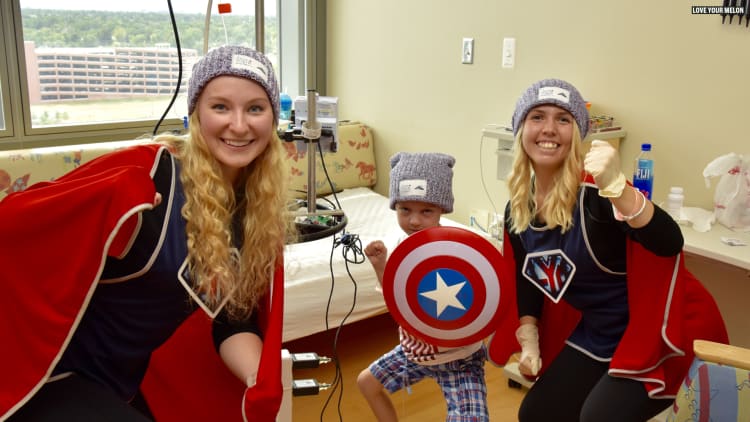Zachary Quinn's project for his entrepreneurship course in college was so successful that he dropped out of college to run the business.
The class project turned start-up, Love Your Melon, became a company with a mission: It sells hats, beanies and scarves and uses some of its profits to help children with cancer.
Love Your Melon began with a "buy one, give one" model. For every hat sold, the company gave a hat to a child with cancer. But Quinn and his friend and co-founder Brian Keller sold so many hats that they had more hats to give away than there were kids with cancer in the entire country.
Now, Love Your Melon donates 50 percent of net profits to partners.
Quinn and Keller were sophomores at the University of St. Thomas in St. Paul, Minnesota, in 2012 when they had the idea to build the business. The first year, they did $61,000 in sales. They set up a table out in front of Quinn's parents' restaurant and peddled hats to passersby.
"It was the first 200 hats we sold [when] we knew we had something big," Quinn says to CNBC.
Whoever they talked to about the hats and their mission got excited. "Everybody lit up," says Quinn. "We sold out of the beanies in two days when our teachers didn't think we could do it in a whole semester."
This year, the Minneapolis start-up, which has 11 employees, brought in $21 million in revenue. Next year its sales target is $50–$60 million, an ambitious goal it hopes to meet by setting up partnerships with larger, big box retailers. Currently Love Your Melon apparel sells in select boutique retailers throughout the country, but most sales are online.
All hats are made in the U.S.A.
In the past four years, Love Your Melon has donated $1.5 million, or half of its profits, to fund cancer research initiatives. By the end of 2016, the company expects to have donated $2.5 million, says Quinn.
The millennial founders have been able to have such remarkable success in such a short period of time thanks in large part to their savvy use of social media.
Love Your Melon has active Facebook, Instagram, YouTube and Twitter profiles. It creates content for those channels every week and boasts impressive conversion rates, since a high percentage of individuals who see that content become customers.
The company also heightens brand awareness by reaching back to college campuses and encouraging volunteer teams of students to visit hospitalized kids battling cancer. Love Your Melon Campus Crews arrive to children's hospitals dressed in superhero capes. More than 12,000 student volunteers across the country at 740 different educational institutions spread the Love Your Melon message. The start-up does three to four photo shoots a week.
The company has also partnered with nonprofits and performers to help design one cancer-stricken child's dream bedroom, for example, and take another child to a private performance with her favorite musician. Documented and shared, these visuals can be very moving.
Love Your Melon is a case study that Facebook touts as a stellar example of how to use social media successfully.
"What I attribute it to is authenticity," says Quinn, now 24 years old.
"A millennial generation has come up with this beautiful thing called social media," says Quinn. "We wouldn't be able to exist otherwise."



